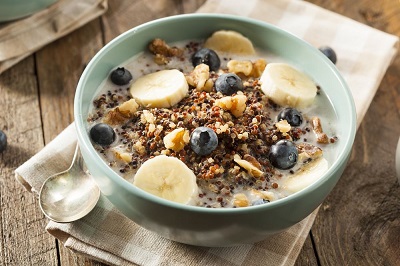 Everywhere we look, it feels like we are being encouraged to eat more fiber. Whether it’s in healthy living articles in the newspaper or advertised on the front of products that are boasting the fact that they are “high in fiber”, everything seems to indicate that this is a very important part of our overall health and that it encourages greater weight loss. But what is the truth behind all of these claims?
Everywhere we look, it feels like we are being encouraged to eat more fiber. Whether it’s in healthy living articles in the newspaper or advertised on the front of products that are boasting the fact that they are “high in fiber”, everything seems to indicate that this is a very important part of our overall health and that it encourages greater weight loss. But what is the truth behind all of these claims?
Why Does Everyone Say to Eat Fiber for Health and Weight Loss?
Are the fiber recommendations just an elaborate scheme to help to make sure that we buy more of a certain kind of food product, or is there actually merit to these promises? Is it just a scheme to try to make us feel like we have some control over our lives, or is this non-digestible component of food really going to provide us with an advantage in achieving wellness goals?
Dietary fibers, which are most commonly found in fruits, vegetables, and grains, are actually very well known for their broad range of benefits in the body. Among them, the most obvious is the prevention of constipation. However, there are many other benefits that can be very important to overall wellbeing and even to proper weight management. If you want to be healthy and lose weight more effectively, then fiber is about to become your best friend.
By consuming the right amount of fiber every day, you will reduce bloating, naturally cleanse your body of any toxins and waste, keep your cholesterol levels closer to where they should be, improve control over diabetes (or a risk of diabetes), improve your chances of healthier blood pressure, reduce your risk of heart disease, and yes, improve your ability to lose weight.
Why Weight Loss Benefits?
When fiber from the food that you eat enters your stomach, and when it is in the presence of water, it will not only swell up to help to make you feel fuller from a smaller amount of food, but it also binds with some of the fats that you have consumed, acting like a natural fat blocker. This way, you will actually absorb less fat from the food that you eat, negating some of its calories. Fiber is also slowly digested, which means that the full feeling that it provides will last a longer period of time than many other kinds of food. This helps to reduce the inclination to overindulge in snacking.
So, take a second look at the fiber in your diet and, if it isn’t satisfactory, you might consider bumping it up a little – or a lot. It’s not difficult to accomplish. Increase the portion of veggies on your plate at every meal and reduce the size of the starches and fats that are on that same plate. Replace your white bread with whole grains. One slice of whole grain bread is more filling than two slices of white bread and is far better for you. The same can be said about other whole grain products to replace those made with white flour, such as pasta.
Simply by having a veggie-packed salad or vegetable soup as a starter before you get to your main meal can mean your body will fill up on fiber first. That way, you’ll be at a far lower risk of overeating when it comes to the more calorie-dense portions of your meal. No reason to skip them altogether, but a little bit of natural, built-in portion control is fantastic for weight loss benefits.
How Much Fiber?
The average American should be eating at least 25 to 35 grams of fiber every day, but actually consumes less than 15 grams. Consider tracking your nutrition for a week or two while you’re eating your typical meals and snacks to find out just how much you’re getting and if you might benefit from topping things up a little.



















